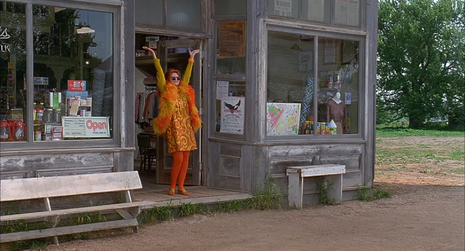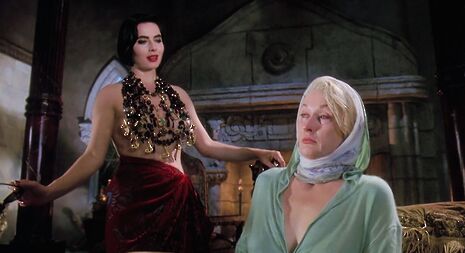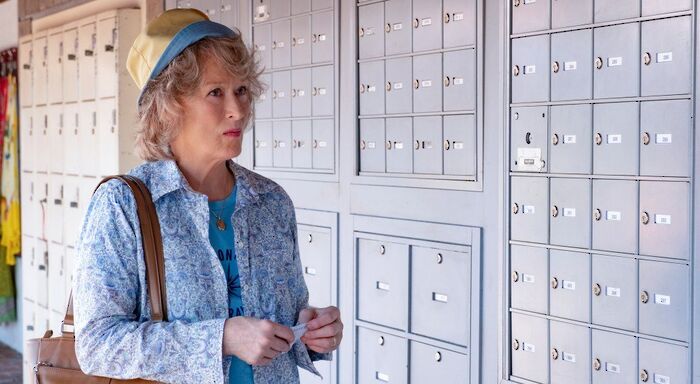A beginner’s guide to camp on screen
In response to our first Film and TV reader’s request, Gabriel Humphreys gifts us his honest, (un)affected guide to camp on screen

Dear Vulture,
After the Met Gala’s 'Camp' theme this year, I realised I didn’t really know much about the word. I don’t feel like doing much extra reading at this point in term (sorry Sontag!), so what can I watch to help me understand (and simply enjoy) the concept?
As we hurtle inevitably towards the end of term, you might find yourself in need of some escapism. I find nothing quite hits the spot like a heavy dose of camp. If you’ve no idea where to start, or just want some extra inspiration, here is my (personal, and absolutely non-exhaustive) beginners’ guide to camp, taking you through some camp classics of the big screen.
Death Becomes Her (1992)
Meryl Streep and Goldie Hawn battle over Bruce Willis’ affection as undead, image-obsessed monsters. What more could you want? A comedic venture into body horror, its tensest moments reveal its camp soul, as Streep hovers dangerously overbalanced on a flight of stairs for far longer than possible before hurtling down them for what feels like an eternity. A burlesque of movie tropes: the evil enchantress; the magic potion; the feuding female beauties and enough pathetic fallacy to make Wordsworth roll his eyes. This one is not to be missed.
Scream (1996)
Perhaps a slightly unexpected choice, but there is a reason the Scary Movie series parodies this particular slasher so viciously. The very horror elements of this mid-90s classic are camp - excessive blood and gore, jump scares that are by their very nature predictable and a twist that could be right out of an Agatha Christie novel. Not to say that it isn’t without tension or isn’t scary – it reformed our image of horror films for the 90s and early 2000s. But watching it back, you can’t help but feel a pang of its risibility.
Hocus Pocus (1993)
Halloween is, after all, the campest of the holidays, and what would any Halloween be without the Disney classic, Hocus Pocus? Bette Midler, Sarah Jessica Parker and Kathy Najimy give us a trio of witches who function like a comedy trio, as they acclimatise to life in the 90s.
Campness here is a kind of rebellion, unafraid to call attention to itself
It’s easy to forget that they actually suck the life force out of a small child, and plan very seriously to do so again. To top off this campy brew, the vocal stylings of Bette Midler are channeled into an impromptu rendition of I Put A Spell On You, with full choreography from her sisters. Well, I suppose you have to spend the 300 years you were trapped as disembodied spirits doing something, don’t you?
The Adventures of Priscilla, Queen of the Desert (1994)
If you need costume inspiration for a campy theme, this is one to pick. The plunging of such wild and vibrant costumes and characters into the rurality of the vast expanses of the Australian outback mirrors the very vision of camp itself – it is a gaudy shining rhinestone on cheap fabric, unafraid to call attention to itself. Campness here is a kind of rebellion, a highly visible abnormality that makes us a target, but also one that empowers and emboldens us to be our true selves.
Whatever Happened To Baby Jane? (1962)

Icons of the big screen Bette Davis and Joan Crawford battle it out in this tense thriller as agèd sisters. Though sometimes horrifying, there is overriding melodrama in the noir-esque music, Davis’ wild makeup, and there is bizarre and uncomfortable comedy in Jane’s imitation of Blanche. The drama is only heightened by the knowledge that the two female stars are battling out a real-life animosity, Hollywood’s most famous feud, immortalised on-screen. This remains a film that informs and instructs the way we perceive camp on the big screen to this very day.
I’m So Excited! (Los amantes pasajeros, 2013)
The camp of Pedro Almodovar has been described as ‘serious camp’, and this surreal, disorientating, drug-fuelled fever dream is just that. The locked room device is re-appropriated as a plane unable to land, forcing characters together in increasingly absurd, shocking and bizarre situations. It is sex and drugs, lies and intrigue, all happening as the characters are suspended at 35,000ft above the Earth.
Spice World (1997)
A Britpop cousin of a 60s Beatles movie, this remains the only Spice Girls’ venture into film. It’s not exactly high art, but it captures a moment in cultural history so perfectly – all gleaming white smiles and crop tops. Amidst asides and breaking of the fourth wall, the production value shows up the girls, as the star of the show is really their Thunderbirds-style model bus that leaps over Tower Bridge. And at the end, they actually get blown up. What could be more insanely camp than watching your (very much living) pop idols explode on screen?
To Wong Foo, Thanks For Everything, Julie Newmar (1995)
“Another drag queen film?!” I hear you cry. Why yes, reader – this one taps into the same Hollywood moment as Priscilla, but sets three of Hollywood’s hunkiest leading men as stunning drag queen, caught up in the smalltown Midwest. Along with Priscilla, they reinvent the roadtrip genre, while speaking to the systemic prejudice and injustice of small-town Middle America. Plus, there’s a Wonder Woman interior decorating makeover sequence.
Hairspray (1988)
You simply could not talk about camp classics without mentioning the father of camp himself – the legendary John Waters. I’m not suggesting that Hairspray is Waters’ most seminal or even his campiest film, but it is a magical gateway drug to the untold wonders of such heights as Female Trouble or Pink Flamingos.
Just don’t be surprised if you’re left more than a bit shocked by the sheer outrageousness of the rest of Waters’ work. A drag soaked love letter to the 60s, full of nostalgia but charged too with an egalitarian agenda. This is the political camp, the queerly rebellious at its best
 News / Colleges charge different rents for the same Castle Street accommodation2 March 2026
News / Colleges charge different rents for the same Castle Street accommodation2 March 2026 News / News in Brief: waterworks, wine woes, and workplace wins 1 March 2026
News / News in Brief: waterworks, wine woes, and workplace wins 1 March 2026 News / Climate activists protest for ‘ethical careers policy’1 March 2026
News / Climate activists protest for ‘ethical careers policy’1 March 2026 News / Angela Merkel among Cambridge honorary degree nominees27 February 2026
News / Angela Merkel among Cambridge honorary degree nominees27 February 2026 News / Private school teacher who lied about Cambridge degree barred from teaching27 February 2026
News / Private school teacher who lied about Cambridge degree barred from teaching27 February 2026










